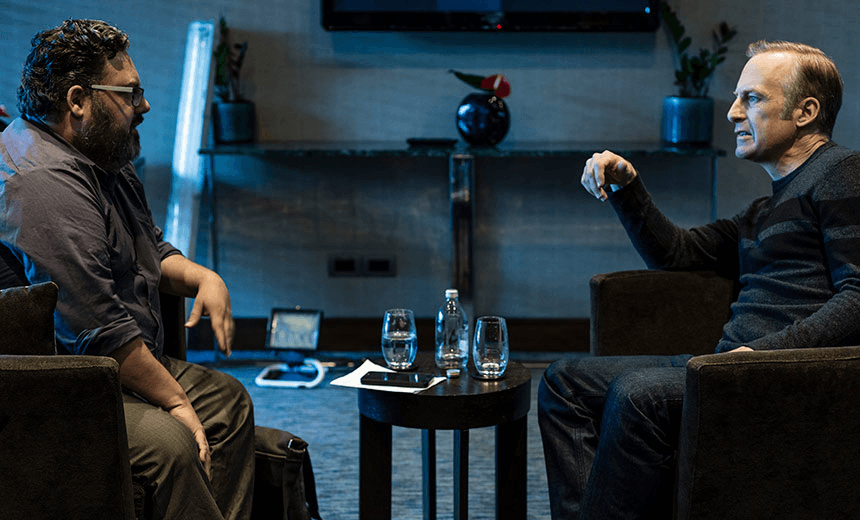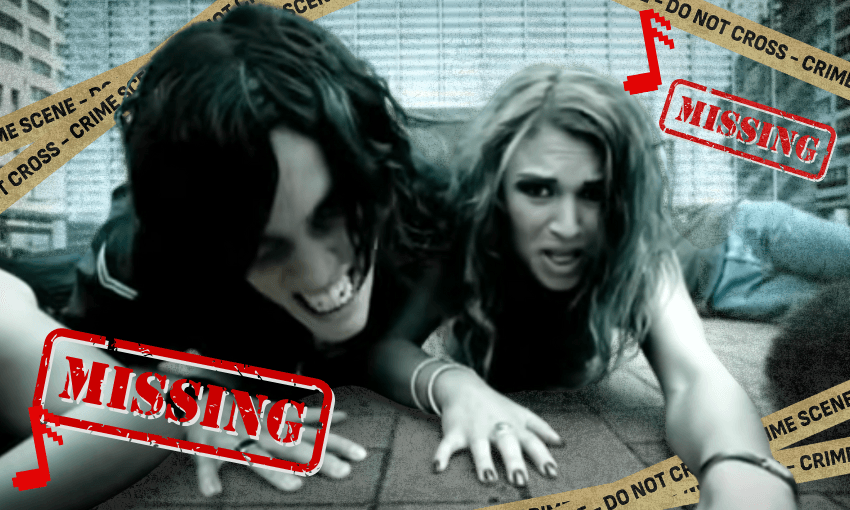Ahead of the arrival of Better Call Saul season three to Lightbox next month, José Barbosa sits down with star Bob Odenkirk to discuss the hidden details in the show, Saturday Night Live vs Trump and why Cinnabon gets the party poppin’.
For a long time, Breaking Bad was the pinnacle of high quality, must-watch TV. The story of Walter White, a chemistry teacher with cancer who turns to cooking crystal meth, made stars of the leads Bryan Cranston and Aaron Paul. The comedian Bob Odenkirk played Saul Goodman, a sleazy ambulance chasing lawyer who helps White launder his meth money (among other things). Odenkirk wasn’t unknown before Breaking Bad, he’d created the cult comedy skit show Mr. Show with David Cross, but both he and Saul became fan favourites.
When Breaking Bad finished, rumours of a spinoff show circled and eventually solidified into Better Call Saul. The prequel is set six years before its parent show, with a focus on how struggling court lawyer Jimmy McGill became the flashy, billboard-boasting Saul Goodman. As of writing, the show has two very good seasons under its belt and a third coming soon, blowing away any suggestion that Better Call Saul was nothing more than a simple cash-in project. In fact, according to this writer at least, Better Call Saul might even be better than Breaking Bad. But that’s a discussion for another time.
We met Bob, son of Oden, son of Kirk, at the end of a long day of interviews. PR had whisked him around to RNZ up the road and then finally to a hotel on Auckland’s waterfront. Nonetheless he seemed fresh and keen with that boundless energy a lot of Americans have. We should all be born Americans, I thought, then we’d be able to get through anything without suffering crippling doubt.
He was thoughtful in his answers, particularly when talking about comedy and drama. Professional in his manner, but not without warmth. His hands were large and he had a big face that the camera just eats up. He asked about going swimming, the photographer suggested Mission Bay. I blurted out that it was good for ice cream, because Odenkirk isn’t just a great comedian and actor, he’s also a solid poet; he once wrote a great poem about ice cream.
He locked his hazel eyes on my dull, brown peepers and the interview began.
Jose Barbosa: I’m going to take care of the most important thing first. My partner is a huge fan, I wondered if you could sign a photo for her? She’s a big, mad fan. Let me show you the photo first, you might find it slightly strange. If you feel it’s awkward, you can just leave. Please don’t leave.
Bob Odenkirk: It’s not me nude?
No, it comes from a place of affection and love. That’s you Bob Odenkirk there, and that’s my partner.
Oh, fantastic. Yes. Why is she marrying me? Or am I giving her away to you?
Well, we kind of have this thing where you are in her top five people she could have a fantasy wedding with. I don’t actually have a list, I keep reminding her.
So what should I say? ‘Tough beans, José’? ‘I win’?
Thank you very much for that, she’ll be over the moon. I’m a bit ambiguous about it either way but, if it makes her happy then I’m happy.
To begin: You were working on Saturday Night Live in New York. It’s interesting how SNL has kind of taken on being one of the main voices ridiculing Trump.
It has become the best possible outlet for politically observing and attacking the behaviour of the Trump administration. They are doing their job stupendously, I think it’s better than it’s ever been. I think the writing is amazing. It’s amazing, I’m just so happy with that they are doing.
It kind of helps as well when you have politicians, or anyone in authority across the world, just being utterly ridiculous.
I don’t know know if it helps, I think it actually makes comedy harder. Trump is such a clown that you can’t exaggerate his behaviour, and they are so obviously inappropriate and unhinged that pointing that out isn’t a revelation at all. It makes it very hard to criticise somebody who is so blatantly over-the-top. SNL figures out ways to show the audience, they concentrate on the people around Trump because those are the people who are making it possible for him to carry on the way he does.
I remember in an interview with you and David Cross, you were talking about how one of the reasons you left SNL was because you wanted to write but also perform as well. Are you finding much of an outlet for that now?
We actually just did a show on Netflix called With Bob and David, and obviously getting to act in Better Call Saul is great. I have an incredible range of opportunities, I’m also a Dad. I’ve got two kids who are nearly out the house, so I also like to be there for the little bit of time that’s left.
What about your input into Better Call Saul as a producer?
My input has grown a little, but I try to avoid helping with the writing. I like being purely an actor on the show, I think it makes me a better actor. I like not having to worry about the structure of the episode, or any of the production aspect at all. So even though I have a producer credit – and they do let me weigh in at times – I pretty much don’t help out. I just act, which I love.
As someone who likes deconstructing comedy and jokes and the formalistic aspects of it, what’s your take on Better Call Saul as drama?
I do think about it. I observe the scripts and the storytelling and think about what they’ve done but, in many ways, I’m still learning a lot about it myself. There are some things that these writers do that are incredibly economical. There’s almost nothing they shoot that doesn’t mean something. There’s meaning behind everything on the show, behind where the camera is placed, every choice by the characters, every word of dialogue. Everything is thought out and, of course, this pays off as time goes by.
There’s a scene halfway through season three, where there’s an object with a lot of meaning. It’s an object that you haven’t ever seen in the show, except for the first five minutes of the first episode of Better Call Saul. Gene goes to a closet and gets out a box. It’s part of a collection of things that you never hear about it or see again until season three, when you finally understand what’s inside the box. There’s almost no detail that hasn’t been thought about. If it’s an object in the room – a chair, the blinds – they’ve thought about what kind of blinds they are, what it means. It’s a kind of deep-focussed thinking that you don’t need in comedy – also kind of comedy is kind of bigger, it’s a bull in a china shop.
Arrested Development was like that though?
It’s interesting, your point is a good one, Arrested Development had those same kind of connections and those reverberations through episodes and seasons and characters, but that’s something I’ve noticed.
Another thing that they do is that characters kind of have self-awareness. See, a lot of characters don’t in the world of entertainment. Almost every character in these good dramas, and Better Call Saul is a good example, has a sense of themselves. Even if they still proceed and behave with their blind spots, they know what their blind spots are. That kind of self-awareness is good, it makes a character smart and I think it makes people relate to them, because most people know their own shortcomings.
Attention to detail, being aware of the viewer, was that so much of a thing on Breaking Bad? I loved Breaking Bad, but I feel like Better Call Saul is a deeper dive into that.
It’s a good question. You’d have to ask Vince Gilligan if that’s the case. Potentially one thing, when I hear that comment from you: Breaking Bad’s production schedule, especially in the first three years until it was a big hit, was more like a normal show. If I’m not mistaken, I was hired for those episodes of season two and they were already shooting the first episodes. As Vince gained more power, he used that power to get himself more time so that he could think more in the future, and he could react even in the editing.
So for instance, Better Call Saul hasn’t premiered yet, it premieres on April 11th on Lightbox, they’re editing episode six. Their goal is to try to get a rough cut of all 10 before the first one even plays on the air. No TV shows do that. But by buying that time, and taking his power that he got in season three of Breaking Bad, he can go ‘oh look, there’s an object, a window, a shot in episode nine and we want it to reflect back to episode one. We can go back. It hasn’t aired yet. We can change episode one and make a little emphasis on the character, on the thought, on the object and then watch what happens in episode nine when it pays off.’
If that’s true, that the details are even more impactful and connected in Better Call Saul, it would be because Vince Gilligan took the goodwill and the power that he had to buy himself time to think and connect things up. It quite possibly is the case.
To wrap up; can you even go into a Cinnabon anymore?
I could go into one, but I don’t know if I could eat anything because I’m 54 and I’ve gotta try to play a guy that’s younger than me, and if I start eating cinnabuns I’m not even going to be able to come close to pulling that off.
So Cinnabon is so good because they put everything your body likes into one place, and then they heat it up, and they absolutely own it. They’re proud of it. So they want you to feel the same way. It is what it is, there’s no lying about it, and enjoy it if you do. When I do the Cinnabon scenes, I get to eat Cinnabon, but that’s once a year for about three days.
Better Call Saul season three arrives exclusively to Lightbox on April 11, click below to catch up on season one and two:



